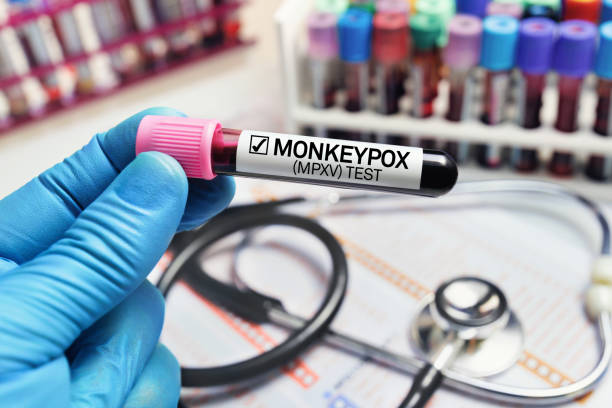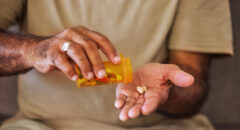
Monkeypox — a cousin of smallpox — is not technically considered a sexually transmitted infection. But it spreads through close contact and is now being transmitted largely through networks of men who have sex with men. Although anyone can get infected, most of the people affected reported some level of sexual activity. This includes penetrative encounters as well as oral sex.
RELATED: Everything You Need to Know About Monkeypox and the Vaccine
Although the virus is theoretically transmitted through respiratory droplets, the CDC has not seen that happen in this outbreak.
Instead, it’s longer contact that seems to be responsible for most cases now.
Researchers are also investigating whether the virus can be spread by someone who has no symptoms, or through semen, vaginal fluids and fecal matter, according to the CDC.
While dancing shirtless at a party that has good ventilation (without interacting with someone who has visible lesions) may be low-risk, enclosed spaces such as back rooms, saunas or sex clubs, or at sex parties where there’s often anonymous contact with multiple partners; increases the likelihood of monkeypox spreading.
RELATED: The CDC is Monitoring new Monkeypox Cases: What is it and Should You Be Worried
“Socializing is a part of what [LGBTQ people] do. So I don’t think that it’s something that we stop. It’s just sort of important to have awareness how monkeypox transmits and you’re aware of your own risk and how to mitigate that risk,” Dr. Demetre Daskalakis, director of the CDC’s Division of HIV/AIDS Prevention, says.
The most recent data from the US Centers for Disease Control and Prevention shows 1,972 probable or confirmed monkeypox cases in the US and about 13,340 around the world. This has doctors concerned that the epidemic may have grown too large and diffuse for them to contain.
Dr. Shira Heisler, medical director of the Detroit Public Health STD Clinic, says she’s proud of the quality of care she provides but simply doesn’t have time to see every patient who needs care. “We just don’t have the bodies,” she says. “It’s a total infrastructure collapse.”
RELATED: What Is Monkeypox, and How Worried Should Americans Be?
Why clinics are struggling
Clinics that treat sexually transmitted diseases — already struggling to contain an explosive increase in infections such as syphilis and gonorrhea — now find themselves on the front lines in the nation’s fight to control the rapidly growing monkeypox outbreak.
After decades of underfunding and 2½ years into a pandemic that severely disrupted care, clinic staffers and public health officials say the clinics are ill-equipped for yet another epidemic.
“America does not have what it needs to adequately and totally fight monkeypox,” says David Harvey, executive director of the National Coalition of STD Directors. “We are already stretched to capacity.”
Because the current monkeypox outbreak causes blisters or pimples on the genitals, many patients are seeking care for what appears to be herpes, syphilis, or another sexually transmitted infection. Patients often prefer to seek care anonymously at public clinics, rather than visit their primary care doctors, because of the stigma of sexually transmitted infections.
Although most people with monkeypox recover on their own in two to four weeks, about 10% need hospital care, says Dr. Peter Hotez, dean of the National School of Tropical Medicine at the Baylor College of Medicine.
The degree of complications from monkeypox “has been much higher than any of us expected,” says Dr. Mary Foote, an infectious diseases expert at the New York City Department of Health and Mental Hygiene, who spoke July 14 during a webinar presented by the Infectious Diseases Society of America. In addition to severe pain, some people with monkeypox are at risk of permanent scarring. Foote says the pain can be excruciating, making it difficult for patients to swallow, urinate, or have bowel movements.
Sexual health clinics have been stretched so thin that many lack the staff to perform such basic duties as contacting and treating the partners of infected patients.
How to protect yourself
Still, there are ways you can protect yourself.
Monkeypox vaccines can effectively prevent infection in people before they’re exposed to the virus.
Experts believe vaccines may help prevent infection after exposure, as well. But they’re most effective if administered within four days after close contact with a monkeypox patient, says Dr. Trini Mathew, medical director of antimicrobial stewardship and infection prevention and control at Beaumont Hospital in Taylor, Michigan. Vaccines given between four and 14 days of exposure may reduce symptoms but not prevent the disease.
RELATED: Not Another Epidemic! Best Ways to Stay Safe And Protected From Monkeypox
Unfortunately, the battered public health system isn’t built for speed.
Although monkeypox tests have become easier to access in recent days, some public health systems don’t have enough staff to quickly locate and test patients’ partners. And because most health professionals have never managed a case of monkeypox, patients often must make multiple visits before being accurately diagnosed.
And in some states, that funding hasn’t yet reached public health departments or sexual health clinics.
Public health workers say they hope monkeypox will be a wake-up call.
“I hope this drives home the need for more investing in public health infrastructure,” says Kwan-Gett of the Washington state health department, “because without that investment, this is just going to happen again and again.”
In the meantime, until the supply improves, you can protect yourself by avoiding contact with those who are clearly infected, especially close face-to-face contact like kissing.
RELATED: "Unbearable": 3 Patients Share What It's Like To Have Monkeypox
“In line with our harm reduction guidance, thinking about reducing your number of partners, potentially trying to avoid anonymous contacts ends up being smart from the perspective of decreasing the risk of exposure,” Daskalakis adds.
In fact, the CDC says people might want to reduce skin contact as much as possible by having sex with clothes on or after covering areas where the rash is present. Keep in mind that while wearing a condom may help, it isn't enough to protect against the spread of monkeypox.
If you choose to have sex with someone who has monkeypox or who might have been exposed to it, it is a good idea to talk about the virus ahead of time.
Also Read:









